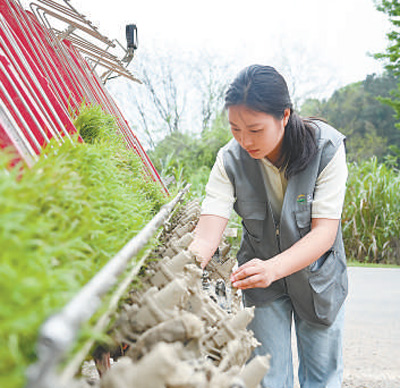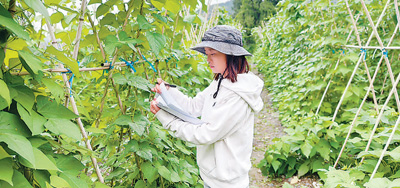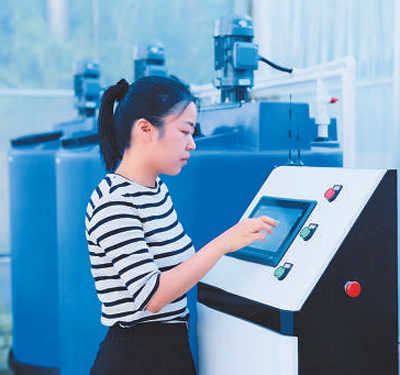




- BRNN
- BRI News
- BRNN News
- Database
Official Documents Polices and Regulations
Inter-government Documents International Cooperation BRI Countries
Business Guide Economic Data BRI Data
Trade
Investment Projects Latest projects
Cases - Content Pool
Today, across the vast rural landscape, young people are integrating their personal aspirations into the broader cause of rural revitalization. In return, the countryside offers a vibrant stage for youth to realize their potential. A mutual attraction and empowerment are taking place between youth and the countryside.
The stories of these youth serve as strong examples of how youthful energy is driving rural revitalization and promising a future of mutual development.
Second-generation farmer brings technology to the fields
During the spring planting season in Sanhe village, Huatang town, Beihu district of Chenzhou city, central China's Hunan Province, a tractor drags a rotary tiller through the fields, churning up waves of mud. Covered in splashes of soil, 28-year-old Luo Yu, who is a tractor driver and head of a local agricultural company, handles the work with ease. Since returning to her hometown three years ago, scenes like this have become a familiar and fulfilling part of her daily life.

Luo Yu checks a rice transplanter in readiness for the upcoming transplanting work. (Photo/Zhang Yiduo)
As the daughter of a major grain grower, Luo returned home to take over the family business. She believed that rural areas hold great potential for the future. But reality hit hard: her father's 4,000 mu (about 266.67 hectares) of farmland was scattered across five townships and towns. Some plots were so small that harvesters couldn't turn around; others were terraced fields entirely dependent on the weather, with no guarantee of yield.
These challenges made her realize that traditional farming methods had to change. "To make grain farming profitable, we must reorganize production and bring more technology into the fields," she said.
Luo proposed consolidating adjacent plots under 1 mu into standardized 4-mu fields, upgrading inefficient terraced land, and building irrigation ditches and paved roads for machinery. Her husband formed a drone team to cut costs and improve efficiency in crop protection.
The results were immediate. "In Shishantou village, after restoring 230 mu of abandoned terraced fields, we harvested 138,000 kilograms of rice that same year, generating 400,000 yuan (about $55,400) in economic value," Luo said.
Luo brought local farmers into the company she leads, pooling their efforts.
Centralized purchases of agricultural supplies reduced fertilizer costs by 28 percent. Unified sales channels raised the rice purchase price by 0.6 yuan per kg. Shared farm machinery services lowered costs across plowing, planting, management, and harvesting. In 2024, her company managed over 60,000 mu of farmland, boosting income for 2,000 households by an average of 15,000 yuan.
That same year, Luo launched a farm machinery training program that trained over 100 agricultural machinery operators.
PhD team helps farmers grow vegetables
After Qingming Festival, or Tomb-Sweeping Day, radishes are nearly ready for harvest in the greenhouses of Huangcang neighborhood, Haibian subdistrict, Weining Yi, Hui and Miao Autonomous County, southwest China's Guizhou Province.
Weining is known for its cool-climate highland vegetables because of its low latitude, high elevation, and limited sunlight. However, for a long time, the area lacked technical support, which made it hard to improve farming efficiency and increase farmers' incomes.

Li Jingwei evaluates the agronomic traits of germplasm samples. (Photo/Pei Yun)
Six years ago, Dr. Li Jingwei, then 30, joined Guizhou University and became part of a doctoral team led by Professor Zhang Wanping at the College of Agriculture of the university. The team set out to address the region's technological gaps in vegetable farming. In her first month, Li went straight to Weining.
She arrived during a field visit by the county's agriculture and rural affairs bureau. At a cabbage farm, a sudden downpour followed a dry spell. The cabbages absorbed water too quickly, causing their cells to rupture and the heads to split—something Li had studied but never seen firsthand. "What I learned in books didn't help in the field," she said. Over the next three months, she focused on applying advanced farming techniques on-site.
"Our team has 10 young PhDs, who are hardworking, dedicated, and like-minded," said Zhang. Each member focused on a specific crop. Their goal was to become experts in a particular crop or key part of the process.
In Weining alone, the team introduced over 10 new vegetable varieties. Their work has expanded to more places in the province. "With better yield and quality, farmers have more ways to boost their income. Growing vegetables with science really makes a difference," said Zhao Jun, head of a local planting and breeding cooperative.
Thanks to the team's efforts, farmers are now using bio-fertilizers, cutting back on chemical pesticides and fertilizers, and improving soil health. They've also learned to compost leftover crops into organic fertilizer.
University graduate returns home to run a farm
These days, the peach trees at Nanye Farm in Dingzhai village, Dingzhai township, Shangyu district, Shaoxing city in east China's Zhejiang Province are heavy with fruit.
Wearing knee-high rubber boots and holding pruning shears, Wang Yuanyuan moves through the peach orchard, occasionally reaching up to trim excess branches and small fruits.

Wang Yuanyuan operates an Internet of Things (IoT) system in a greenhouse in Dingzhai village, Dingzhai township, Shangyu district, Shaoxing city, east China's Zhejiang Province. (People's Daily Online/Dou Hanyang)
After earning her undergraduate degree in animal science from China Agricultural University in 2013, she made the decision to return to her hometown to build a career in agriculture.
"My goal was to use what I'd learned to help my family," Wang explained. Back then, livestock farming was booming in the village, and her father planned to start a pig farm. She volunteered to return home and assist.
However, her early years back in the countryside weren't easy.
"I tried large-scale pig farming, agritourism, B&Bs, and orchards, but none really worked out," she recalled. Looking back, Wang attributes the setbacks to her lack of experience and limited access to information.
Inspired by the area's beautiful natural scenery, Wang turned her focus to rural tourism. She invested more than 1 million yuan to build a farm. The farm eventually found its footing with an eco-friendly and sustainable model, creating jobs for eight villagers.
As her efforts gained momentum, other villagers were inspired to join in. Water-themed container B&Bs, cafés, and countryside hotels sprang up. Dingzhai village developed several popular projects, receiving over 900,000 tourist visits annually.
With support and guidance from the local government, Wang also helped establish a new farmer alliance in Shangyu district. The group aims to attract more young, educated, tech-savvy, and business-minded entrepreneurs who were born in the 1980s and 1990s to go back to the countryside.

Tel:86-10-65363107, 86-10-65368220, 86-10-65363106